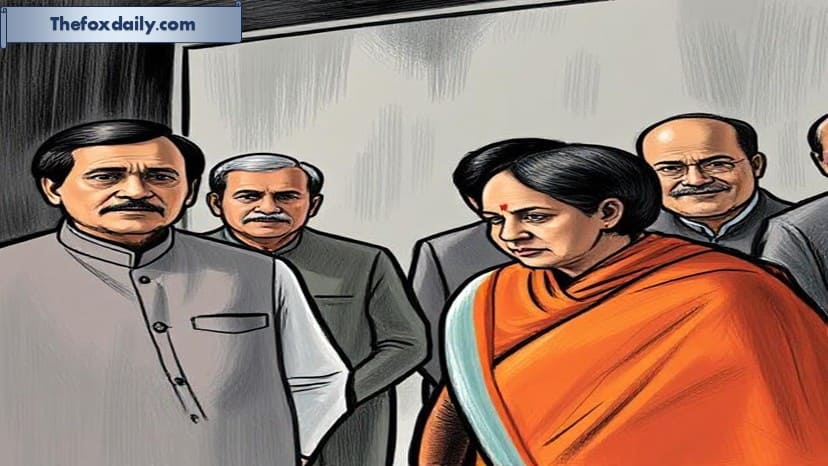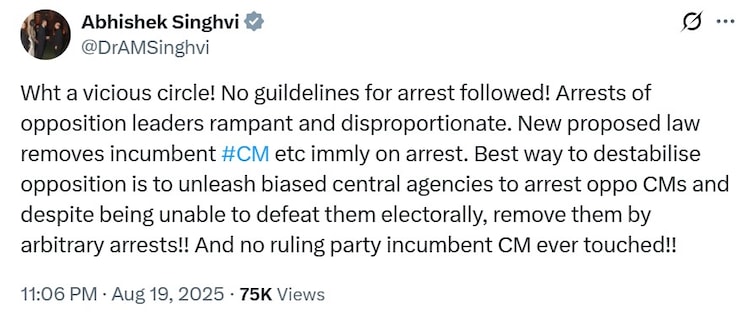
A minister, chief minister and even the prime minister can lose their post in a month on being arrested for 30 days in a row if three bills that are set to be introduced in Parliament on Wednesday get approval.
Even though the opposition has gone on the rampage, calling the laws “draconian,” the government hopes to close up a relatively dull Parliament session with a bang. Home Minister Amit Shah is scheduled to present the bills.
WHY OPPOSITION IS UP IN ARMS?
One of the main concerns of the opposition is that the government will utilize the legislation to arbitrarily arrest ministers and chief ministers in order to destabilize states that are run by the opposition.
“Best way to destabilise opposition is to unleash biased central agencies to arrest opposition CMs and, despite being unable to defeat them electorally, remove them by arbitrary arrests,” Abhishek Manu Singhvi, a member of the Congress
“Best way to destabilise opposition is to unleash biased central agencies to arrest opposition CMs and, despite being unable to defeat them electorally, remove them by arbitrary arrests,” Abhishek Manu Singhvi, a Congress legislator, wrote

Consider this. In the liquor policy case last year, AAP chief Arvind Kejriwal was imprisoned for six months before being released on bail. He operated the government from prison during the six-month period. It was only after he got bail that he stepped down.
If the new bills were in place, Kejriwal would have been automatically removed as chief minister on the 31st day of his custody after arrest.
The government has presented the laws as a significant reform aimed at reducing the criminalization of politics. The opposition is anticipated to fiercely oppose the passage, though, and given the Supreme Court‘s concerns of the way central agencies operate, they may even pursue legal action.
Let’s first examine the three laws and their provisions, nevertheless.
CHIEF MINISTERS, WHAT ARE THE COSTS TO REMOVE PM?
The Constitution (130th Amendment) Bill, the Government of Union Territories (Amendment) Bill, and the Jammu and Kashmir Reorganization (Amendment) Bill 2025 are the three legislation scheduled for introduction.
If a prime minister, chief minister, or minister is detained by the courts for 30 days in a row, they will be automatically removed, according to the Constitution (130th Amendment) Bill. However, the offence for which they are held should be punishable for five years or more.
Therefore, they may be dismissed from their positions even if they are not found guilty. They are placed on par with civil servants, who are suspended upon arrest, thanks to the legislation.
This has drawn attention to the Prevention of Money Laundering Act (PMLA), which the ED has recently utilized to apprehend a number of opposition leaders. The ED has the authority to make an arrest under the PMLA and deny someone bail for 30 days.
In this case, after the 30-day period has passed, the chief minister or minister detained under the proposed law will no longer be able to serve. This is the reason why the opposition is worried.
However, after being released from detention, the president or governor may later re-appoint the prime minister, chief ministers, or ministries.
Jammu & Kashmir and the Union Territories, which are governed by a different legal framework, will be subject to similar restrictions.
THE CENTER HAS BRINGN THE BILLS, BUT WHY?
Presently, there is no bar on ministers holding on to their offices after being arrested.
If an MLA or MP is found guilty of a crime carrying a sentence of two years or more, they will be disqualified under the Representation of the People’s Act.
Last year, the issue of leaders continuing in power became a flashpoint between the Centre and the opposition following the arrest of then-Chief Minister Arvind Kejriwal and Tamil Nadu minister V Senthil Balaji.
In the last section, we described the Kejriwal situation.
Chief Minister MK Stalin kept Balaji in the Cabinet without a portfolio despite his detention in a money laundering case. A slugfest with the governor had resulted from it.
THE SUPREME COURT’S ED CRITICISMS
The opposition has alleged that the new bills, if passed, would give unbridled powers to central agencies to arrest or detain chief ministers and ministers of non-BJP states.
In recent months, the Supreme Court has expressed strong concern over the conduct of central agencies, especially the ED, saying it was “crossing all limits”.
Earlier this month, the highest court admonished the ED, “You cannot act like a crook,” emphasizing that the agency must operate entirely within the law.
In July, Chief Justice of India BR Gavai pulled up the ED and asked why it was being used for “political battles”.
For breaking news and live news updates, like us on Facebook or follow us on Twitter and Instagram. Read more on Latest India on thefoxdaily.com.


COMMENTS 0